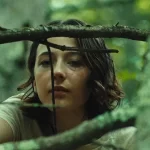Sundance 2020: Shirley, by David Bax

It’s hard to imagine that any of those “men’s rights” doofuses would ever find themselves watching Shirley, Josephine Decker’s curdling psychodrama that fictionalizes the period during which Shirley Jackson (Elisabeth Moss) wrote her 1951 novel Hangsaman. But it would be a delight to see those paranoid nincompoops freak out at a story that revels in the conspiratorial relationship that develops between two women while their husbands are off at work.
Rose (Odessa Young) is accompanying her new husband, Fred (Logan Lerman), to Bennington, Vermont, where Fred has just been hired as an assistant professor to Stanley Hyman (Michael Stuhlbarg), Jackson’s husband. The young couple are to live with Shirley and Stanley, with Rose acting as a sort of housekeeper/caretaker to the often depressed and antisocial author.
Shirley‘s opening shot is an extreme close-up that moves up along Jackson’s tangled and matted hair to her face, pallid and sweaty from being bedridden. This intense subjectivity and its resultant interiority, recognizable to fans of Decker’s last film, Madeline’s Madeline, persist throughout the new film. The smoke-filled rooms and dust-gathering nooks and crannies of Jackson’s home come to reflect her cluttered mental state and, eventually, that of Rose as well. Until, that is, we start to suspect that both women’s minds are far clearer than they seem.
In a Polanski-esque way, then, Shirley approaches a kind of psychological horror. The relatively sheltered Rose initially finds the relatively uninhibited world of arts and literature both terrifying and alluring. The interpretative dance troupe practicing on the quad show up again in her wild dreams and visions, which dot the film’s landscape. Later, the movie’s horror will become more somatic, as Rose realizes that–like so many young women–her body is subject to unwanted physical attention, much of it from Stanley (though Shirley is fiction, the real Hyman’s predilection for young woman is well-documented). The home all the characters share seems a perfect inspiration for the woman who would later write The Haunting of Hill House. Every footfall, typewriter strike or dropped book resonates like a poltergeist pounding on the walls.
“Most young women are fascinated by their mortality,” Shirley says to Rose, who verbally disagrees but seems to embody that observation more and more as the story progresses. She is pregnant; meanwhile, a young woman her age has recently gone missing. Shirley explores the edge of birth and death where young women like Rose exist and asks us to ponder whether trust and abandon or ownership and agency are better suited to navigate it. It’s a wonderfully scary thing to ponder.





























